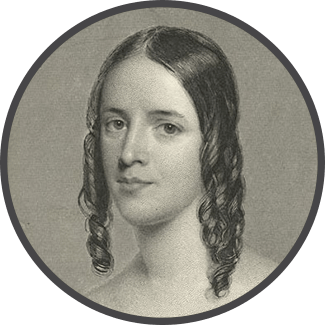Contents
Contents
It is not generally known that Joel Barlow – the poet, philosopher and politician, the author of the Columbiad and other works – owed much of the formation of his mind and character to the wife of his elder brother Aaron. Much of his time in early life was spent in the society of his sister-in-law, who was a woman of strong mind, and united the qualities of gentleness and resolute firmness. Her residence was at Redding, Connecticut, in the south part of the, town, called by the Indian name of “Umpawag,” which it still retains. The country is much broken, and the ground almost entirely covered with stones; yet the soil was rich enough to reward the labor of the husbandman, and for some years after their marriage the young couple lived there in comfort.
When the stirring scenes of the Revolution commenced, both were called to act their part. The husband entered the army in the service of his country, and in a short time was promoted to the rank of colonel. His military duties required long absences from home, and the young wife was left to take the entire charge of her helpless little ones. The courage and resolution she displayed, in the midst of many trials, moved the admiration of those who knew her, and presented an example which ought to be recorded for the benefit of her countrymen. No feminine fears were strong enough to prevent the calm discharge of her duty to her family. At one time a rumor came that the British army was approaching and would probably reach Umpawag that very night. The terrified inhabitants resolved on instant flight, and each family, gathering together such of their effects as they could take with them, quitted the village, and were travelling nearly the whole night to reach a place of refuge from the enemy. Mrs. Barlow could not carry away her children, and to leave them was out of the question; she therefore remained to protect them, or share their fate, being deserted by all her neighbors. No enemy, however, was near; the groundless alarm having been caused by the firing of some guns below.
At one time during the war, a brigade of the American troops under the command of General Putnam, was quartered during the winter months at Redding. The head-quarters of the General were in an old-fashioned house, standing at some distance from the road, with a green lawn in front. A lane led from this to the public highway. Nearly a quarter of a mile distant, and parallel with this ancient mansion, stood the residence of Colonel Barlow.
The story of Mrs. Barlow’s heroism, in remaining alone in the village when the attack from the British was apprehended, was of course told to the bluff General, and gained his admiration for the intrepid young mother. He also heard much of her fortitude amidst the privations to which she was obliged to submit; of her gentle and courteous, though retiring deportment, and her cheerful endurance of evils common to all, which she hoped might result in the accomplishment of great good to her country. It is said that, feeling a curiosity to make the acquaintance of one whose character met with his strong approbation, he took a stroll over the fields towards her house, on a frosty morning in February – wearing the simple dress of a countryman – and made her a visit; his ostensible errand being a neighborly request that Mrs. Barlow would be kind enough to give or lend him a little yeast for a baking.
He entered the kitchen without ceremony, where the matron was busily engaged in preparing breakfast, and stopping a moment to look at her, asked for the yeast. But she had none to give, and told him so, each time his request was repeated, without suspending her employment to look at her visitor. It was not till after his departure, that she was informed by her old black servant who it was, who had asked the favor with such importunity.
“I suppose” was her remark, “had I known him, I should have treated him with rather more civility; but it is no matter now.” And Putnam, who had observed her cheerful countenance, and attention to her domestic affairs, saw that she was of the proper material for the matrons of the infant nation.
The house in which General Putnam had his head-quarters at this time was long celebrated on that account. It was taken down a few years since, and a new and elegant mansion erected on the spot where it stood. The inhabitants of Umpawag saw with regret what they could not but deem the sacrilegious destruction of a dwelling so hallowed by association, and rich with reminiscences of the early and glorious struggle of our country for freedom, that a more costly edifice might be built on the ground it occupied.
Rebecca Barlow was the daughter of EInathan Sanford, of Redding, and was born in the village where she resided after her marriage. A few years after the war ended, Colonel Barlow, with his family, removed to Norfolk in Virginia, where he subsequently fell a victim to the yellow fever. The whole family suffered with the disease; and after the burial of her husband and daughter, and the recovery of the others, the widow returned to her former home at Umpawag. She died at an advanced age. Some of her sons have rendered important services to their country as statesmen. The youngest, Thomas, accompanied his uncle Joel, the Minister Plenipotentiary at the Court of France, as his Secretary; and after the death of Joel at Zarnovica, in the winter of 1812, escorted his wife, who had been left in Paris, to America. The remains of the minister were brought with them, and placed in the family vault at Washington.

